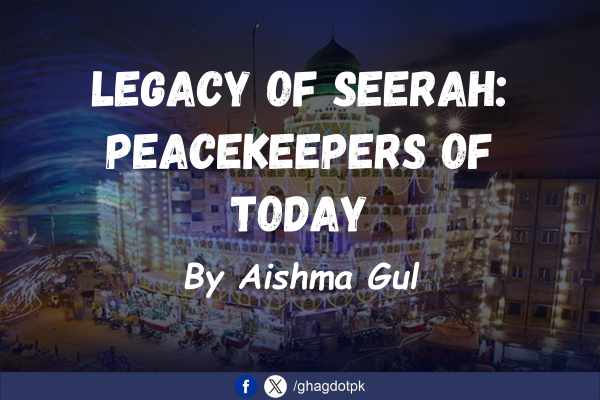By Aishma Gul
Just as light disperses darkness, the teachings of the Holy Prophet (SAW) guide us through the challenges of our times, showing the path to peace, justice, and unity in our nation. The 12th of Rabi ul Awal is a day of great religious significance for Muslims around the world. This day is observed with tremendous reverence and enthusiasm in Pakistan, with the country participating in a variety of activities in honor of the Prophet’s life and teachings.
As we celebrate Eid Milad ul Nabi, it is essential to revisit the timeless principles of the Holy Prophet’s (SAW) teachings, which provide valuable guidance on maintaining peace and security.
Key Lessons from the Seerah on Security
The Seerah offers valuable lessons on security, including:
– Building a Strong Defense Force: Develop a capable and disciplined defense force for protection.
– Intelligence and Strategic Planning: Utilize intelligence and careful planning to prevent threats.
– Justice and Rule of Law: Establishing fairness and impartiality is essential for maintaining peace.
– Defensive Preparedness: Always be prepared to defend the community while seeking peace.
– Diplomacy and Peace Treaties: Prioritize peaceful solutions through treaties and negotiations.
– Unity and National Cohesion: Promoting brotherhood and unity among different groups strengthens security.
– Ethical Conduct in Warfare: Ensure humane and ethical conduct, even during conflict.
– Protection of Minorities: Safeguard the rights and safety of non-Muslim citizens.
– Peace as a Path to Security: True security comes from pursuing peace and reconciliation.
In line with these principles, Pakistan’s security forces strive to follow in the footsteps of the Holy Prophet’s (SAW) teachings, adopting principles that promote justice, unity, and compassion in their operations.
Seerah-Inspired Security Efforts
The Pakistan Army and security forces reflect the teachings of the Seerah by their dedication to justice, national cohesion, and defensive preparedness. Their assistance to civil authorities in maintaining law and order reflects their role in ensuring peace in regions like Khyber Pakhtunkhwa and Balochistan. The Army’s emphasis on ethical conduct during operations, coupled with their reliance on intelligence-based strategies, highlights their dedication to safeguarding the nation.
In keeping with this spirit of unity and protection, Pakistan eagerly celebrates Eid Milad ul Nabi, a festival that reflects the country’s dedication to peace, compassion, and devotion.
Celebrations in Pakistan
In Pakistan, cities and towns come to life with vibrant processions, Mehfil-e-Milad celebrations, and Naat competitions. Quran Khawani sessions are held in mosques and madrasas, and Islamic organizations play an important role in organizing them. The spirit of giving is demonstrated through Langar (meal distribution to the less fortunate). The day brings people together in love for the Prophet and promotes peace and compassion.
Furthermore, the Pakistani government has announced Tuesday, September 17, 2024, as a national holiday in honor of the 12th Rabi ul Awal. The government has announced preparations to celebrate Eid Milad ul Nabi in a large and organized way, including public processions, religious conferences, and the illumination of significant buildings.
To ensure the safety of these gatherings, law enforcement agencies have implemented robust security measures.
Security Measures
To ensure public safety during these celebrations, several regions, particularly Khyber Pakhtunkhwa (KPK), have implemented increased security measures. Locations with a history of security issues, such as KPK, will see considerable police deployments and intelligence-based operations. Major cities will see additional patrols and monitoring, with security personnel stationed at mosques, procession routes, and significant public locations. Law enforcement agencies have put strong security measures in place, including increased patrols, CCTV surveillance, and bomb disposal units on high alert, as intelligence agencies work together to prevent any potential threats.
Following the teachings of the Holy Prophet Muhammad (SAW) is crucial for building a just and peaceful nation. His emphasis on justice, unity, and ethical leadership provides timeless guidance for modern governance and social harmony. By promoting fairness, compassion, and respect for diversity, these principles help foster national unity, reduce conflict, and ensure the well-being of all citizens. In today’s complex world, his teachings encourage strong moral foundations, accountability, and the pursuit of peace, which are essential for a nation’s stability and progress.






